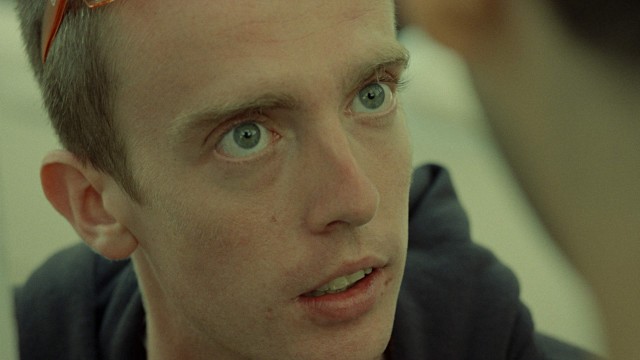Ratking is the closest I’ve seen a film come to replicating the feeling of weed paranoia. You know, those times when nothing is really the matter, but the THC mixes with latent anxiety to send your amygdala into overdrive. Suddenly mundane tasks feel fraught, your self-consciousness becomes crippling, and basic human interactions are nightmares to navigate. Fortunately, viewing these symptoms dramatized in a short film is more pleasant than experiencing them for yourself, and, in the hands of writer/director Eric Colonna, the travails of a young couple hoping to make it to the beach take on a darkly comic quality as we knowingly identify with an escalating series of minor annoyances that conspire against them.
Identified in the credits only as “girl” and “boy”, the film begins with the girl (Natasha Sill) recounting a dream in bed to the boy. It’s the sort of intensely mortifying dream that bundles up anxiety, sexual shame, and social embarrassment so vividly that it doesn’t take Freud to be able to interpret it. Yet, the couple is able to laugh it off, smoke a joint, and agree to head to the beach that day. Still, the scene plays as something of a statement of purpose for the entirety of what follows, as the pair experience a series of tragi-comic vignettes designed to both be relatable, yet also worm their way under the viewer’s skin. An encounter with a drifter who is a little too intense, a disgusting stain in a favorite article of clothing, the certainty that you hear an animal underneath the floorboards—in isolation they are unpleasant, perhaps even dread-inducing, but paired in succession the film takes on the unusual quality of an absurdist horror film—is the couple cursed?
The story grew organically out of conversations with friends about anxiety, what it is, and the strange ways that it distorts perception.
More so than plot, tone is the priority for Colonna and his team as the film takes on the air of a bet—how close can they get to replicating the sensation of anxiety via the toolset of film? While the Los Angeles creative-class setting and drug-haze milieu feel specific, the film is ultimately exploring universalistic manifestations of dread. As Colonna explains:
While individual episodes within the film are chosen to be relatable, that concept of distorted perception is key to Colonna’s aim with the film. Sound design and cinematography take on outsized roles in cultivating this sensation. Environmental triggers like blaring car alarms, sirens, and barking dogs are subtly layered into the sound mix providing an underlying room tone of disorder. The original music of the film is psych-heavy with spacey synthesizers pairing with acoustic guitars early on, before later transitioning into lugubrious soundscapes, with heavy gurgling bass notes that feel like they’re being slowed down and cascading brighter notes breaking through in drunken, arbitrary fashion.
The photography is similarly designed to disorient. The go-to moves from Colonna and cinematographer, Andrew Finch, are slow, almost imperceptible zooms in and out, paired with ever-so-slight handheld motion, the combination of which nearly replicates the sensation of being too high and having the boundaries of objects go a little soft. Blocking and editing serve a function too, as certain shots are held exaggeratedly long only to then cut to uncomfortable extreme closeups, keeping the viewer just slightly off balance, and continually a bit uncomfortable.
Back to the plot, whether our couple makes it to the beach or not feels beside the point, and their trials pass without much in the way of lessons (though I might suggest to them that they smoke less weed). Yet in the closing scene, they do end up staring into the face of their anxiety, just as the girl did in recounting her dream at the beginning of the film. These hopeful bookends soften the nihilistic drag of the film’s nightmarish middle and seem to suggest that though anxiety is inevitable, we all have the ability to confront it in a forthright way, with both confidence and humor.
“I hope “Ratking” feels familiar to some people, as strange as it is. The whole thing was a bit of an experiment to see if we can get people to relate to something that we don’t fully understand ourselves,” Colonna tells us. That is as good of a statement of intent as I’ve seen. Winner of the Grand Prize at Slamdance 2022, I won’t say the film is definitively the most “Slamdancey” film I’ve ever seen, but it surely belongs on a short list, and if one is going to go the route of deprioritizing plot, I selfishly like them to be able to use the diverse disciplines within filmmaking to communicate something “true”. Ratking does that with a high degree of skill and imagination, and while it is far from an easy watch, it is one of the most impressive we’ve had so far this year.

 Jason Sondhi
Jason Sondhi
